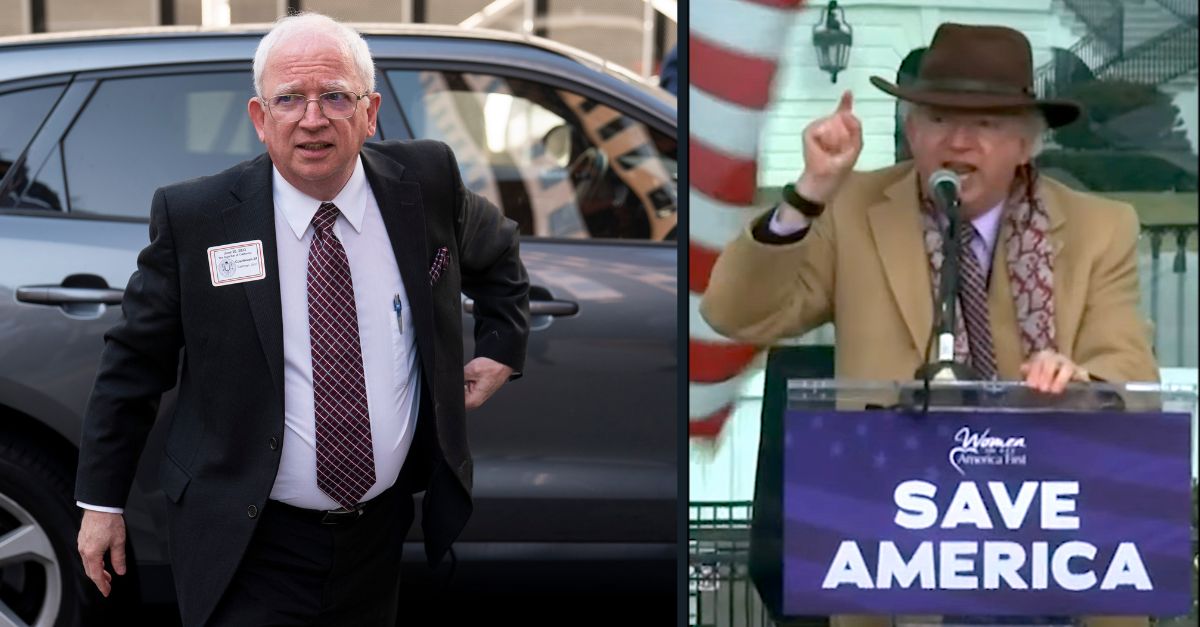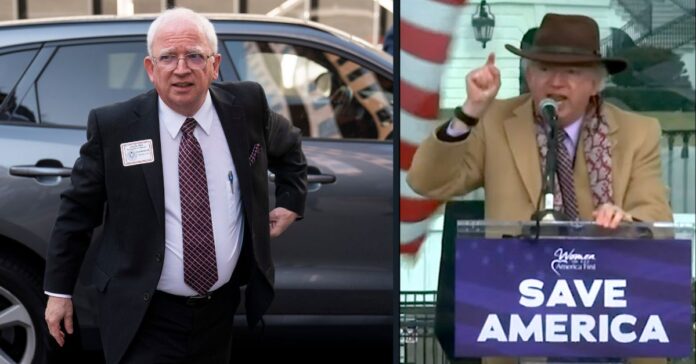
Left Attorney John Eastman, the architect of a legal strategy aimed at keeping former President Donald Trump in power (AP Photo/Jae C. Hong). Right: Eastman speaks at the so-called “Stop the Steal” rally in support of Donald Trump on Jan. 6, 2021 (Screengrab via YouTube)
In a searing recommendation for John Eastman’s disbarment on Wednesday, a judge on the State Bar Court of California recounted how a legal scholar advanced spurious theories in contravention of what he claimed to believe from Bush v. Gore until October 2020 about the 12th Amendment and Electoral Count Act, only to become the driving force behind Jan. 6 efforts to block congressional certification of the election Donald Trump lost.
State Bar Court Judge Yvette D. Roland found that the Office of Chief Trial Counsel (OCTC) successfully proved Eastman violated 10 of 11 attorney misconduct counts, only dismissing one moral turpitude count relating the Eastman’s Jan. 6 speech at the Ellipse.
“Although four of the five statements made at the Ellipse were false and misleading, OCTC failed to provide any evidence that Eastman’s statements ‘contributed to provoking the crowd to assault and breach the Capitol . . . when such harm was foreseeable,”” Roland explained.
From here, the scales all tipped in the other direction for Eastman, as the judge said the California attorney licensed since 1997 should “be disbarred” for his lawyering in the course of representing the Trump campaign in 2020.
The decision and order walked through the Eastman-backed failed efforts to overturn the election at the U.S. Supreme Court, where Texas Attorney General Ken Paxton (R) decried mail-in voting expansion as a “massive opportunity of fraud,” and added that even the “appearance of fraud in a close” race could be enough to review “even if no election fraud had resulted.”
Recall: the Texas case was an original action — a state versus state case at SCOTUS — so if the justices allowed Paxton leave to file a bill of complaint, the justices would have had to take up the case. But they didn’t, and only Justices Clarence Thomas and Samuel Alito would have granted that leave, they said, under the belief that SCOTUS doesn’t have “discretion to deny the filing of a bill of complaint in a case that falls within our original jurisdiction.”
Eastman once clerked for Thomas.
The disbarment recommendation pointed to Eastman’s effort to intervene in the Texas case two days before it was rejected. In Eastman’s motion to intervene, Roland said, he included the declaration of an economist he did not communicate with in order to advance his fraud claims. The academic, Dr. Charles Cicchetti, later “disavowed” the Texas case publicly, the judge said:
In an April 2022 article published in Academia Letters, Dr. Cicchetti criticized and disavowed the Texas Bill of Complaint arguments which were purportedly based on his declarations. Dr. Cicchetti noted that antithetical to “various critiques the Cicchetti Declarations did not claim Trump won or any evidence of fraud was found.” Rather, he noted that “[s]ome critics base their statements on the Texas Attorney General Ken Paxton’s complaint which erroneously claimed the December 7, 2020 Declaration placed exceptional odds in favor of Trump winning” and pointedly stated that “[t]he Declarations do not support what Paxton claimed about Trump winning or the odds of this were overwhelmingly [sic].”
Even more troubling, the judge said, was Eastman’s Jan. 6 theory that then Vice President Mike Pence had the power under the 12th Amendment as President of the Senate to unilaterally overturn the election.
Roland noted that Eastman’s embrace of this idea coincided with the 2020 election — and ran counter to what he said in 2000 about Bush v. Gore on the 12th Amendment and Electoral Count Act.
“For example, in November 2000, when Eastman testified before the Florida state legislature in connection with the Bush v. Gore presidential election, Eastman explained that Congress counts the votes, Congress is the ultimate arbiter as to any disputes regarding the count and, Congress answers to no one on this issue,” the judge said.
Even in mid-October 2020, just weeks before the election, Eastman rejected the legal take of Trump supporter Bruce Colbert that the 12th Amendment let Pence decide “authoritatively what ‘certificates’ from the states to ‘open’ and what electoral votes are ‘counted,’ under the 12th Amendment and the Electoral Count Act of 1887, 3 U.S.C. §15.”
According to the disbarment recommendation, Eastman answered, “I don’t agree with this. The 12th Amendment only says that the President of the Senate opens the ballots in the joint session and then, in the passive voice, that the votes shall then be counted. 3 U.S.C. §12 says merely that he is the presiding officer, and then it spells out specific procedures, presumptions, and default rules for which slates will be counted. Nowhere does it suggest that the President of the Senate gets to make the determination on his own. §15 doesn’t either.”
Roland was not persuaded that Eastman’s about-face was credibly attributable to “a significant amount of additional research” on the subject.
“Acknowledging that these were positions Eastman held for over 20 years, positions which were contrary to the two-page memo scenario which stated Vice President Pence had unilateral authority to count and resolve disputed votes, Eastman claimed that his change of position between October 2020 and December 2020 was due to a significant amount of additional research,” the judge said. “Approximately 11 days later, on January 3, 2021, Eastman drafted and sent a six-page legal memorandum to Epshteyn, an attorney and strategic advisor to Trump’s campaign (six-page memo). Eastman composed this memo to outline a range of scenarios or options he was recommending to President Trump and the Trump campaign regarding the January 6th strategy they should pursue.”
The judge also rejected Eastman’s First Amendment defense of “multiple false and misleading statements in his professional capacity as attorney for President Trump in court filings and other written statements, as well as in conversations with others and in public remarks.” Why? Because Eastman “knowingly made these false statements or had no reasonable factual or legal basis for making them.”
And Eastman committed this misconduct as part of a “collaborative effort” with then President Donald Trump to “impede the counting of elector votes on January 6, 2021, as articulated in Eastman’s memos,” Roland continued.
Giving Eastman’s “good faith belief” defense no weight, the judge held a lack of candor, indifference, and “multiple acts of wrongdoing” against him.
In commenting on Eastman’s “lack of remorse,” Roland said that the “scale and egregiousness of Eastman’s unethical actions far surpasses the misconduct at issue” in the case of Donald Segretti, whose law license was suspended for two years after he admitted to committing misdemeanor crimes in his capacity as a Richard Nixon 1972 election campaign operative.
A “ratf—ing” trickster whose name came up in Watergate, Segretti pleaded guilty to misdemeanor offenses for distributing “letters containing false accusations about other candidates for president in order to create confusion among the candidates,” perhaps most infamously the claim that a Democratic senator fathered a 17-year-old girl’s child.
Unlike Eastman, Segretti “recognized the wrongfulness of his acts, expressed regret, and cooperated with the investigating agencies,” Roland said. And unlike Segretti, Eastman’s “wrongdoing was committed directly in the course and scope of his representation of President Trump and the Trump Campaign.”
“This is an important factor, as it constitutes a fundamental breach of an attorney’s core ethical duties,” the judge emphasized.
In closing, Roland said that, in her view, Eastman’s “apparent inability to accept responsibility” shows there’s a significant risk he “may engage in further unethical conduct, compounding the threat to the public” — unless he is disbarred.
“Given the greater magnitude of Eastman’s transgressions compared to Segretti and the heightened risk of future misconduct from his complete denial of wrongdoing, imposing greater discipline than in Segretti is appropriate to protect the public and uphold public confidence in the legal system,” she said.
The order said that Eastman’s “inactive enrollment” would go into effect three days from Wednesday and “terminate upon the effective date of the Supreme Court’s order imposing discipline.”
Eastman, a former Chapman University law professor under indictment along with Trump in Georgia, has already said that he intends to ask a State Bar Court panel to review the decision. If that doesn’t work, Eastman could then ask the California Supreme Court to step in.
Eastman called it an injustice that he may not be able to work as attorney to pay off legal bills stemming from the Georgia RICO case even as he is presumed innocent.
Read the 128-page disbarment recommendation here.
Have a tip we should know? [email protected]

